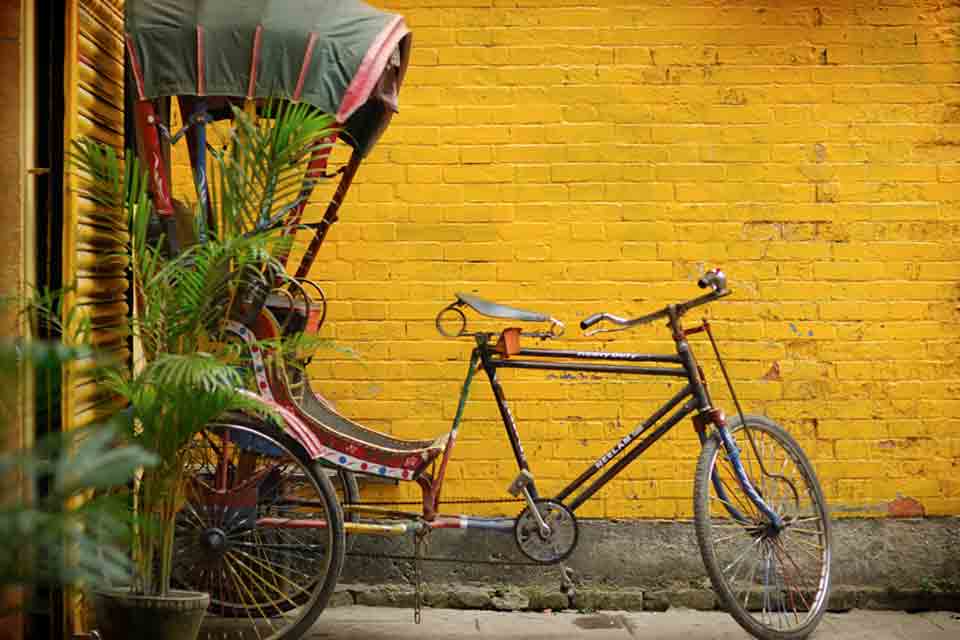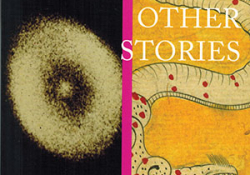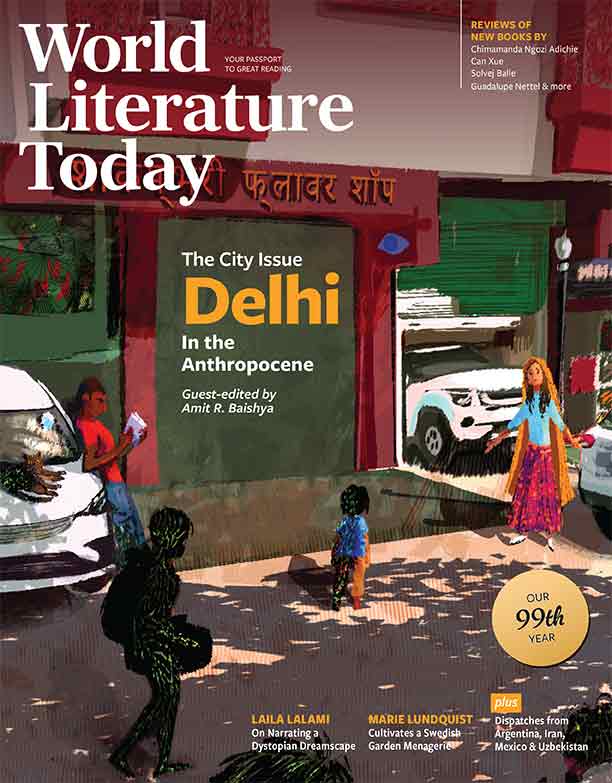Riksha

The road to Delhi is hot with a heat that is no respecter of persons.
Shekhar was woken by a loud sound, like a cannon. He started awake, heart thumping, and saw the dead bird—a large one with a bare, scrawny head that had apparently landed on the hood of the car. He felt as though he was drowning in a river of fire, it was that hot. He wiped the sweat off his forehead with the sleeve of his Dolce & Gabbana shirt and tried to sit up. The car was ominously silent. He turned the key, but nothing happened. He was out of petrol; the AC had stopped working. The car was probably hotter than the blazing heat outside. No wonder he felt like shit. How could he have fallen asleep like that? He opened the door and staggered out. The air outside smelled of dust. The silhouette of the petrol station he had left behind was barely visible in the distance—why had the place been closed on a day like this? Ahead of him, the road went on through the baking plains—no tree in sight, just kilometer after kilometer of desiccated fields. The road to Delhi. Just a twenty-minute drive away there would be some air-conditioned dhabas at the perimeter, catering to travelers. Not the kind of places he would stop at, normally, but in an emergency—
The dead bird was a vulture of some kind. Dropped out of the sky due to the heat. Its featherless head was twisted toward him, one open eye seeming to glare at Shekhar. It seemed to him like a horrible omen. He looked away. Why wasn’t there any traffic? No people at all? Then, he remembered the extreme heat warning. He’d been leaving his business meeting at the hotel when he’d heard the radio in the lobby. He’d never paid attention to heat advisories before—they hadn’t affected him in the past, so why worry? But now, in this emergency—
He tried calling Sheetal on the phone again, but the signal strength was too low. She hadn’t answered his texts either. It had been a mistake, that fight of theirs. She was a brilliant secretary but a vicious, jealous, petulant lover. His wife, Charu, hadn’t answered his texts either. She was probably at her mother’s or at one of her parties, damn the woman. He called the emergency police line again, and this time there was a ring. He cleared his throat to speak, and his phone died. He kicked the side of the car in frustration. The phone was new, expensive even for him. What a useless piece of junk, to quit on him like this. Just his luck, to be stranded in such a godforsaken place, not a soul in sight, no shelter from the sun. There was nothing for it. He would have to start walking.
He stuffed his water bottle into his leather briefcase and started walking determinedly toward the city. Within a few minutes he knew it wouldn’t work, that he would faint in the heat. As he stood there under the blazing sky, he heard a sound behind him, a rhythmic, asthmatic creaking, and turned. A decrepit old riksha was coming up the road, with a thin, swarthy man pedaling it. Shekhar leaped into the road, shouting with relief—stop, stop! The riksha man had a white cloth around his head and wore nothing more than a pair of old shorts and a thin cotton undershirt. He turned toward Shekhar, slowed, but didn’t stop pedaling. Shekhar ran after the riksha, shouting—“I have money! Lots of money! I’ll pay you extra if you take me to Delhi—to the nearest petrol station! The nearest dhaba!”
The riksha stopped and Shekhar got on. The man resumed pedaling, his wiry muscles straining with the additional effort. It was so hot! Shekhar wiped his forehead with a tissue and leaned back in the seat with relief. He hadn’t been in a riksha since childhood visits to his grandparents. Thank goodness this one had turned up out of nowhere like this. He started thinking about the cold beer at the nearest dhaba, surely no more than forty minutes in this contraption.
Shekhar hadn’t been in a riksha since childhood visits to his grandparents.
A few minutes later, the riksha man turned his head toward Shekhar. “Would you have some water, sir?”
“No,” Shekhar lied. He had that one insulated, BPA-free bottle of cool water in his briefcase that was only three-quarters full.
“I’ll get you water when we get to a dhaba,” he said. The man said nothing. The riksha creaked its way along through the furnace-like heat.
But, only about ten minutes later the riksha stopped. The riksha man slid off the bicycle seat and stood trembling in the heat.
“What’s the matter with you, man?” Shekhar said.
“Too hot, sir. I can’t do this. I’m not feeling well.”
The man crumpled upon the ground. Horrified, Shekhar leaped down from the seat and knelt by him. The fellow seemed to have fainted. With some revulsion, Shekhar shook the man’s shoulders. His skin was dry. Thank goodness, his eyes opened, but they were blank, unseeing. A shudder shook the man’s body, and his mouth opened in a silent cry. Hurriedly, Shekhar opened his water bottle and poured a little water into the man’s mouth. The riksha puller coughed and spluttered. No, no point wasting water on him. The fellow was hardly capable of operating the riksha.
It occurred to Shekhar with a horrified incredulity that he would have to pedal the riksha himself. For a moment he was filled with an impotent rage, rage at Sheetal, at his wife, at his staff, for letting him—him, Shekhar, come to this. He would need to teach them a lesson, once this was over. He forced himself to be practical. Maybe he could detach the bicycle from the rest of the contraption? But it was welded to the passenger section, so no hope there. He maneuvered the riksha away from the man curled up on the ground and was about to leap onto the bicycle seat when the fellow groaned.
Shekhar didn’t know what impulse prompted him to carry the fellow—so light he was—up on to the passenger seat. He laid him there, deciding that if the man slid off on to the road, it was no longer his, Shekhar’s, responsibility. He had done his bit. He wiped his forehead again. It was hot! The air shimmered around him, and his senses swam for a moment. He took a swig of cool water from his bottle, climbed with some difficulty onto the bicycle seat, and began to pedal.
After a while he had to take off his shirt and roll up his trouser legs as far as they would go. He put his tie in the briefcase with his phone and the papers. His jacket—now where was his jacket? Probably left behind on the road, when they had stopped. It didn’t seem to matter now. The strap of his briefcase was slung around his shoulder, and his skin burned fiercely beneath it. The light around him was white-hot and the air silent as death, except for the creaky rhythm of the riksha. Thank goodness he kept himself fit, exercised at the gym at least twice a week. He would get there. He saw before him, far in the distance, a sign of some sort and, behind the sign, the rise of a cluster of buildings, the hope of civilization, Delhi! He would be there soon. It wasn’t that far. He began determinedly to think about the coolness of the beer at the dhaba, his air-conditioned bedroom at home.
It was only fifteen minutes later that he realized he couldn’t go on, that the road was too long, and the images that shimmered ahead most likely were mirages. He had finished all the water in the bottle. His eyes were dry, swollen with heat and dust. Suddenly, there was a roar behind him—a truck thundered past, a massive metal monster that almost grazed him, with the logo of his company emblazoned in green paint on the sides. He shouted and waved, but the truck kept going with magnificent indifference. A cry of agony escaped him and hot tears wet his eyes. He pumped his legs harder, irrationally hoping he would catch up with the truck, but it was no use—it was a cloud of dust in the distance. Then he saw the tree.

The pipal stood beside the black, burning road like a protective god.
It was a large tree, a pipal, by the side of the road. There was a deep pool of shade beneath it, and in the dust lay a dog, one of the hardy desi street dogs, fast asleep or dead. Shekhar could hardly believe his eyes. He hadn’t much noticed trees before, he had never had to think about them—but this one stood beside the black, burning road like a protective god. He pulled over to the side of the road and stepped off the seat. His legs shook and he almost fell to the ground. The man on the passenger seat was still comatose, but the sudden stop had flung his body forward, so that he slid limply onto the footrest and from there onto the dusty ground, just short of the shade.
Shekhar lay down in the shade. The coolness closed over his body like a benediction. He had stopped sweating, although it still felt like his body was on fire. It occurred to him that he must leave some clear sign that he was here, in case anyone came looking for him. With great effort he took his tie out of his briefcase—it was golden yellow, with a distinctive dark blue pattern; his wife had bought it for him on his last birthday. He staggered to his feet, holding onto the tree trunk, and hung the tie from one of the lower branches. Then he lay down again.
It seemed to him that he was already in the dhaba with the lovely Sheetal and a glass of cold beer before him. There was music playing. The riksha man was sitting opposite him, asking for water, his mouth a black orifice with betel-stained teeth. There was someone else beside him, a very old man or perhaps an old woman. When he looked at her, her body turned into a tree, leaves sprouting along her arms and neck. Through the foliage, her eyes looked at him with infinite sadness and a hint of mockery. “I know you from somewhere, don’t I?” he started to say, and he thought he remembered her from childhood, but the darkness was coming up from the floor of the dhaba like a tide, and he knew nothing more.
Around sunset, Charu saw the message from her husband. When all attempts to contact him failed, she got a little worried and more than a little angry, and drove some distance down the road away from the edge of the city. The heat had receded a little, and under the red sky the land lay like a blood-stained chadar. She turned back before the point where his car lay abandoned. Twice she passed a lone pipal tree casting a deep shadow upon the burning land, and noted the riksha, the prone body of the driver at the edge of the asphalt, and another half-naked body under the tree a little distance away, but apart from making a mental note that she should probably let the police know about these two, she didn’t give it much thought. Back in town, she reasoned that her husband had probably caught up with Sheetal and was two-timing her in some hotel room somewhere. She had a party to attend that evening, so in the rush of getting ready, she forgot to call the police about the two bodies. She came home at 2 a.m. and angrily registered Shekhar’s continued absence. Around 4 a.m. she got up to turn down the AC—there was something wrong with the temperature control, and the room always got too cold by this time. When she was under the quilt and half-asleep, a latent memory came rushing into her consciousness, making her sit up abruptly, her heart thumping. She remembered the bit of cloth hanging from the tree where the two bodies had lain, the thing she had hardly noticed with her conscious mind at the time: a golden-yellow tie with a distinctive blue pattern, one she had chosen herself for Shekhar last year.
The AC switched itself on and began to hum.
Delhi












